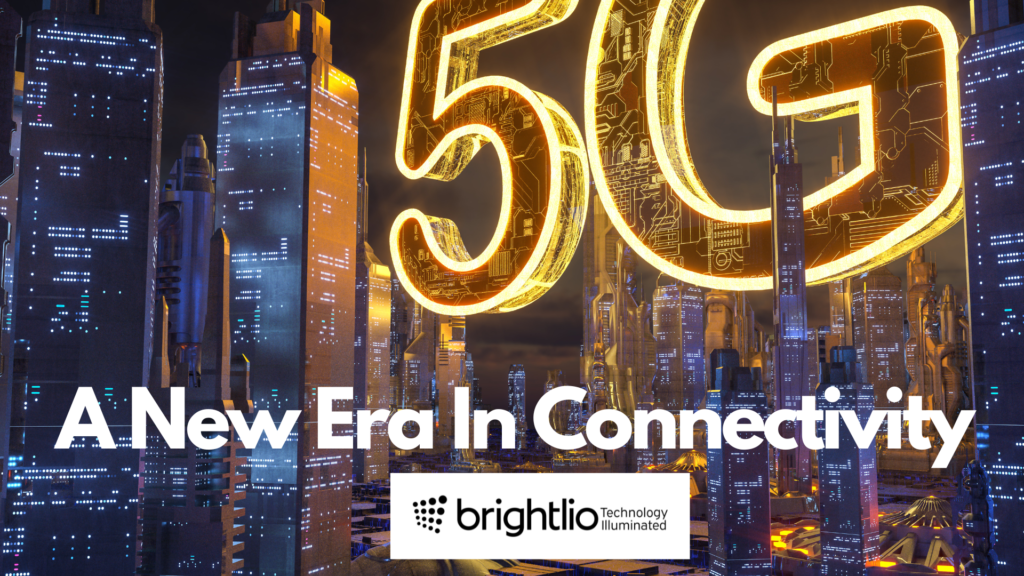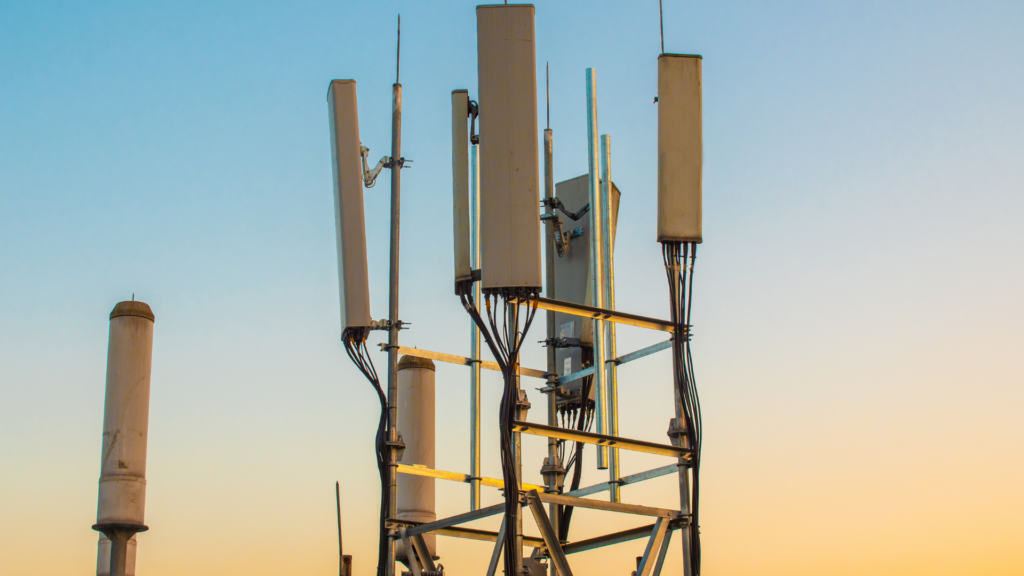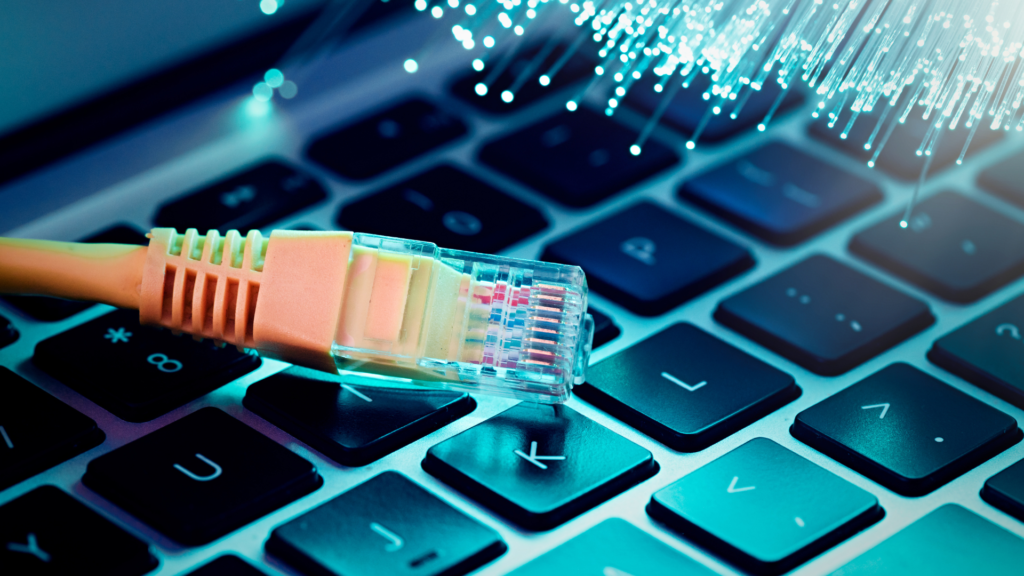
Table of Contents
5G Business Internet: A New Era in Connectivity
5G business internet is gearing up to revolutionize how companies communicate. With impressive speeds and superior reliability, 5G promises to be one of the most essential business internet service options. In this article, we will:
- Discuss 5G business internet technology and its benefits.
- Outline the differences between 5G and broadband / dedicated internet service.
- Review the benefits of leveraging 5G business internet service with SD-WAN.
- Discuss how Brightlio delivers internet solutions for our clients
Let’s get started!
Expanding Horizons: The Benefits of 5G Business Internet
The rise of 5G business internet is more than just an incremental evolution in connectivity. It’s a transformative shift that redefines how businesses operate and compete in an increasingly digital world. Here, we delve deeper into the benefits that 5G brings to the business landscape, ranging from accelerated data speeds to enhanced scalability.
Speed and Efficiency
The most significant advantage of 5G is its exceptional speed. It offers data rates up to 100 times faster than 4G, dramatically improving the data transfer rate. This makes 5G business internet fit for unified communications, cloud services, video conferencing, and other latency-sensitive applications.
Keep in mind 5G is in the process of being rolled out. There is limited availability in select areas only. Performance varies considerably based on geography. Plus, not all carriers offer the same business internet speeds.
That said, T-Mobile, Verizon, AT&T, and other service providers now provide speeds starting at 100 Mbps with ranges up to 1 mile. Speeds up to 400 Mpbs are available in some coverage areas. This is a significant improvement from the 25 Mbps to 30 Mbps companies get with 4G/LTE.
Lower Latency
5G technology significantly reduces latency. With latency expected to be as low as one millisecond, 5G enables near real-time communication between devices. This is crucial for customers utilizing latency-sensitive applications like unified communications and video conferencing.

Greater Capacity
5G networks can accommodate a far higher density of simultaneous connections than their 4G counterparts. This changes the game for customers employing Internet of Things (IoT) technology, where thousands or even millions of sensors and devices might be interconnected, transmitting data simultaneously. From smart office environments to vast automated manufacturing facilities, 5G offers the capacity to keep up with the burgeoning IoT landscape.
Enhanced Mobility
As a wireless technology, 5G provides superior mobility. This is an undeniable boon for businesses with a remote or mobile workforce, allowing employees to work and collaborate effectively, no matter where they are. Whether video conferencing from a customer’s office or accessing complex cloud applications on the move, 5G ensures your team stays connected and productive.
Traditional internet services also require professional installation. With 5G business internet, a professional install is unnecessary, as the setup is easy. This makes it a fit for internet service at temporary locations, construction sites, and home internet service.
Robust and Reliable Connections
Despite its speed and capacity, 5G doesn’t compromise on reliability. It provides robust connections, even in densely populated areas or peak usage times. This ensures your business stays online and operates smoothly, irrespective of external factors.

5G Broadband and 5G Fixed Wireless Services
While both 5G broadband and 5G fixed wireless services utilize the groundbreaking speed and low latency of 5G networks, their implementation and use cases can be notably different. Understanding these differences is crucial for customers when evaluating their connectivity needs.
5G Broadband
Broadly speaking, 5G broadband is often used to refer to the general use of 5G networks for internet connectivity. This could be mobile broadband accessed by smartphones, tablets, or other mobile devices, or it could be a home or office broadband connection, delivered via a 5G router.
5G broadband is inherently mobile and versatile, with its use cases stretching from high-speed internet on mobile devices to serving as the primary internet connection in a home or small business environment. This article focuses on 5G broadband connectivity and its benefits for customers.
5G Fixed Wireless
On the other hand, 5G fixed wireless services specifically refer to a method of providing internet connectivity to a fixed location, such as a home or office, using wireless 5G networks. This is an alternative to traditional wired connections like fiber or cable. The connection is established through a stationary device—a fixed wireless terminal—that communicates with the nearest 5G base station.
Unlike 5G broadband, which can be used on the go, 5G fixed wireless serves as a replacement for or supplement to wired internet services, often providing high-speed internet access in areas where wired options are limited or unavailable. Fixed wireless is also typically a dedicated service. This means that customers get to connect with committed amount of bandwidth coupled with a service guarantee.

Can 5G Replace My Existing Broadband Connection?
A question commonly arises when discussing 5G business internet is whether it can replace existing broadband connections entirely. It will undoubtedly be an excellent broadband replacement shortly. Your service address and requirements will determine if 5G is a suitable replacement for your broadband connection today.
5G coverage is expanding rapidly, but it’s not everywhere today. If you want to be an early adopter, research your local area and consult with service providers to understand the strength and reliability of the 5G signal. Also, remember that upload and download speeds will vary based on your current service address.
If 5G business internet has availability in your area, test it out. Many providers, including T-Mobile, offer customers’ plans on month-to-month terms with no set up fee. This allows you to evaluate if the service meets your needs. If not, you can cancel without incurring additional fees. T-mobile is also has a limited time offer of a 10 year price lock, which let’s you future proof your pricing as the technology advances.
Broadband also has limited options at times, especially in more rural areas. We worked with a client recently that required two connections for redundancy. Only one broadband service was available at their address. 5G business internet from T-Mobile allowed them to procure a secondary connection for only $50 monthly.
Navigating these considerations can be complex. Leveraging the expertise of a telecommunications broker like Brightlio can provide invaluable guidance, ensuring your business makes a well-informed decision that supports its long-term growth and success.

What Are the Differences Between 5G and Dedicated Internet?
5G is a wireless technology, making it more flexible and accessible to deploy than many wired solutions. It operates over radio waves and requires a 5 G-compatible device to connect. On the other hand, dedicated internet is a fixed broadband connection that offers exclusive, direct connectivity between your business and the internet service provider (ISP). You need to install physical infrastructure, such as fiber or copper cables, at your location.
5G boasts impressive data speeds that can potentially exceed those of many existing broadband services and offer significantly lower latency. However, these speeds can vary based on network congestion, distance from the 5G tower, and physical obstacles. While 5G networks are designed to be robust and resilient, they may be affected by weather conditions, building materials, and geographical obstructions.
On the contrary, dedicated internet provides consistent and guaranteed bandwidth with symmetrical upload and download speeds, regardless of the time of day or network congestion. This consistency makes it an ideal choice for customers that require reliable high-speed connections for critical operations.
5G typically has lower set up costs than dedicated internet, which doesn’t require physical cabling. However, the ongoing costs will depend on your service plan. Dedicated lines, while generally more expensive due to their superior reliability and consistent speeds, can offer greater value for customers with heavy data usage.

The Benefits of 5G with SD-WAN
Combining 5G and Software-Defined Wide Area Networks (SD-WAN) can help customers shape a highly resilient, scalable, and budget-friendly network infrastructure. SD-WAN allows enterprises to combine technologies like 5G and LTE with broadband or dedicated internet circuits. The technology then routes traffic over the best connectivity option for the application.
SD-WAN allows clients to get more from their bandwidth expenditure by using multiple connections simultaneously. It also eliminates some downsides to 5G, like upload and download speed variations, since it can be combined with a fixed connection service.
The combination of 5G and SD-WAN enhances business continuity as well. If the primary network faces a disruption, SD-WAN’s intelligent routing can seamlessly switch over the traffic to the 5G network, thus reducing downtime and maintaining business operations. Customers can enjoy uninterrupted service while lowering costs by incorporating 5G as a redundant solution alongside existing broadband or dedicated internet connections.

Conclusion
In an era of rapid digital transformation, 5G business internet is a beacon of change, driving efficiency, reliability, and innovation. It offers many benefits, including higher speeds, lower latency, greater capacity, enhanced mobility, and superior scalability.
When paired with technologies like SD-WAN, it can provide businesses with a cost-effective, flexible, and robust solution that optimizes network performance and ensures seamless connectivity. Furthermore, it is a viable, lower-cost alternative to traditional broadband or dedicated internet, offering an efficient availability solution while significantly reducing costs.
Brightlio Delivers 5G Business Internet Solutions!
As a leading telecommunications broker, Brightlio helps our clients with 5G business internet service and other connectivity solutions. We review your speed and bandwidth requirements to find the best solution for your needs and budget. We offer solutions from providers including T-Mobile, Verizon, AT&T, WiLine and more. Our team also researches options, so that you don’t have to, to find service plans with availability at your locations.
Brightlio also offer solutions, including colocation, unified communications, cloud, and advisory services. This allows us to deliver a complete technology solution. We are committed to being your most responsive and most trusted business partner.
Contact Brightlio today to get started!
Frequently Asked Questions
How much faster is 5G compared to 4G?
5G can offer business internet speeds up to 100 times faster than 4G, with average speeds likely to be about ten times faster. However, exact speeds depend on many factors, including location, network, and device.
What is the difference between 5G and Wi-Fi?
5G and Wi-Fi are wireless technologies providing internet access, but they operate differently and have different use cases. Wi-Fi typically includes internet access in a localized area like a home or office, using a router connected to a broadband internet service. The range of Wi-Fi is usually limited, and its performance can be influenced by factors like the number of devices connected, distance from the router, and physical obstructions. Equipment charges may also be associated with your Wi-Fi router, depending on your service provider.
On the other hand, 5G is a cellular technology that provides broader area coverage and is designed for mobile use. It offers advanced features including fast download and upload speeds and low latency. Fast speeds and low latency makes it suitable for customers that need reliable, high-speed internet on the go.
5G access typically requires a subscription to a cellular service plan, and while you might need a specific device or adapter to access the 5G network, these costs are often included in the plan.
Can 5G completely replace my existing broadband connection?
While 5G can provide impressive business internet speeds and low latency, it depends on your business needs. For some, it can serve as the primary internet connection. For others, it might serve as a complement or backup to an existing wired connection. Typical download speeds and upload speeds vary based on speed tiers and location. To locate qualifying service plans in your area, contact Brightlio.
How can Brightlio help my business transition to 5G?
Brightlio can assist you with understanding your specific needs, evaluating the best providers and packages, and guiding you through the transition process to minimize disruption and maximize benefits. We offer solutions, including Verizon 5G business internet, T-Mobile 5G business internet, and more.
We evaluate the business plan that is right for you. As plans vary by location, we offer options based on your budget and service address.
What are the costs associated with transitioning to 5G?
Costs can vary significantly depending on your specific needs, the chosen provider, and the type of equipment required. You can typically avoid set up fees. Select offers will also allow you to cancel anytime. Terms apply as do other fees potentially. Brightlio can help guide you through these details to find a solution that fits your budget.
Is 5G a fit for edge computing?
Absolutely. Its next-gen network technology features extremely fast speeds and low latency, essential for moving data processing closer to where it’s generated at the “edge” of the network. This combination enhances service performance, making it ideal for real-time applications that require immediate data processing and response.
Recent Posts
Vancouver Data Centers: Colocation in the Pacific Northwest
Business Broadband Solutions: The Ultimate Guide
Let's start
a new project together



